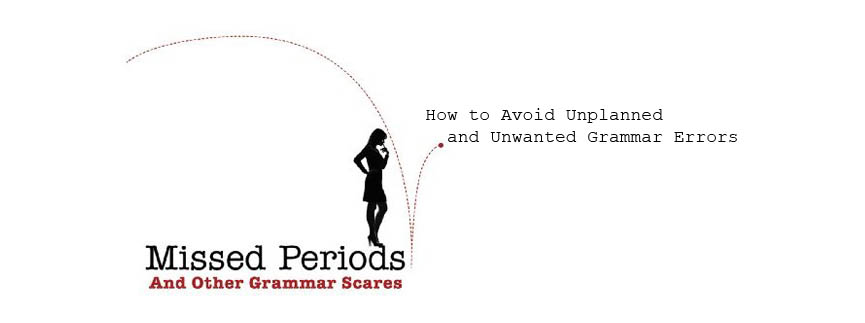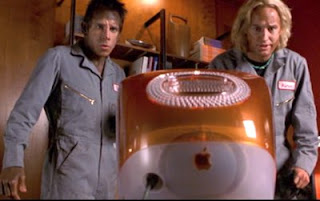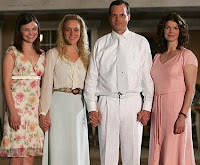 Yesterday, I ran into my neighbor, and before I could stop myself, I felt like Michael Richardson following his routine at the Laugh Factory: I said something I wished I could take back. I asked my neighbor, “How are you?”
Yesterday, I ran into my neighbor, and before I could stop myself, I felt like Michael Richardson following his routine at the Laugh Factory: I said something I wished I could take back. I asked my neighbor, “How are you?”All I can say is that I’m glad I had eaten a snack and peed not too long before I asked; her stories are like a Dickens novel recited by a parrot: detailed and repetitive. And the worst part is that she had just returned from a trip to Europe. This story was going to take as long as it took her to get through security at LAX. I might as well take off my shoes and stay a while.
You know what would come in handy during times like these? An ellipsis.
An ellipsis is these three little dots:
…
Its purpose?
We use it when we delete material from an otherwise word-for-word quotation.
Sometimes when we are writing, we use direct quotations from other sources to make our point or add to the discussion, but we don’t want to use the whole thing. It’s either too long or part of it is irrelevant. But, it’s not cool to just remove other people’s words without leaving a trace. So, out of respect to the original quote, we put the ellipsis where those words were.
So, for example, here’s my neighbor’s quote:
“I’m great. You know, we got back from Europe on Sunday. It was amazing, but I am still jet lagged. I just feel so groggy, but I have so much to do today. We’re having Bill’s family over for dinner tonight. I am going to make quail. I’ve never made it before. They say it tastes like chicken. So, why don’t I just make chicken? Well, it’s always nice to try something different. But, I have to go to a special market. The markets in Europe are so small. Have you ever been to Europe? It’s beautiful, but, you know, I am so jet lagged. It was nice talking to you, but I have to go.”
And, if I had my way, it would have looked like this:
“I’m great…I have to go.”
It still answers my question, but it doesn’t include any of the weird quail information.
Now, I know that what I just said about the ellipsis bummed a lot of you out. I know that a lot of you love to use the ellipsis as your primary form of punctuation. In fact, may I be so bold as to suggest that it’s your punctuation of choice when you’re not sure what punctuation to use?
Well, I have some good news and some bad news for you ellipsis over-users:
The good news is there are other uses for the ellipsis besides using it in direct quotes. The bad news is that you still won’t get to use it as much as you want to.
We can also use the ellipsis to indicate a long, thoughtful pause.
My favorite part of Italy was the museums…actually, it was the Italian men.
Don’t cheapen it by using it when you’re not being thoughtful.
It also indicates trailing off. So, for example, if my neighbor had taken an Ambien because of jet lag and then decided to write something, it might look like this:
I’d love to finish telling you all about Europe, but I am getting sleepy. There is more to come, much more…
Let’s just hope the Ambien doesn’t have the same effect on my neighbor as it had on my friend who got up in the middle of the night and painted her dog green.
References:
http://www.punctuationmadesimple.com/PMSEllipsis.html











 I am so grateful I’m not famous. How mortifying to have your romantic life on display for the world to see. Although, admittedly, having been married for six years, it would not be nearly as juicy:
I am so grateful I’m not famous. How mortifying to have your romantic life on display for the world to see. Although, admittedly, having been married for six years, it would not be nearly as juicy: Similarly, we can’t just rush from one sentence into another without a break in between. It can be tempting, but it’s not fair to your reader, and ultimately, it’s not fair to yourself because your reader will have a hard time understanding what you are trying to say. Here's an example of what happens when we do:
Similarly, we can’t just rush from one sentence into another without a break in between. It can be tempting, but it’s not fair to your reader, and ultimately, it’s not fair to yourself because your reader will have a hard time understanding what you are trying to say. Here's an example of what happens when we do:




 By that, I mean that the dash doesn't provide quite the same level of emphasis, but it does provide some.
By that, I mean that the dash doesn't provide quite the same level of emphasis, but it does provide some.

 Try pronouncing annnd. It's a little hard on the throat.
Try pronouncing annnd. It's a little hard on the throat.



 Who isn’t? Commitment is confusing, complicated, and it stirs up all of those old insecurities: insecurities, for example, that arise when we don’t know if a word has two m’s and only one t, two t’s and only one m, or two t’s and two m’s?
Who isn’t? Commitment is confusing, complicated, and it stirs up all of those old insecurities: insecurities, for example, that arise when we don’t know if a word has two m’s and only one t, two t’s and only one m, or two t’s and two m’s?




